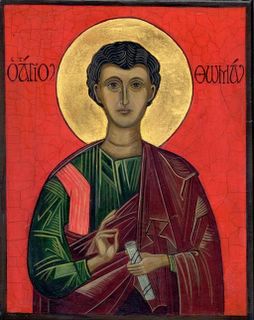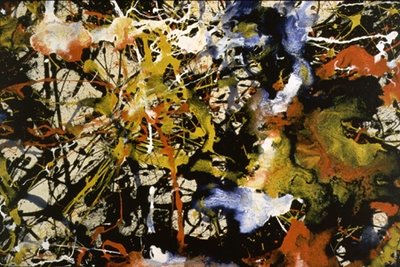DIDYMUS DICTA
DAILY MEDITATIONS ON THE PSALMS
About Me

- Name: Didymus
Each morning I spend 30 minutes, more or less, researching and writing on a passage of scripture. This is principally a form of spiritual self-discipline. But comments and questions are welcome.
Friday, September 15, 2006
On September 15, 2006 I began a new morning meditation on the Gospel of Mark. You can find this new collection of meditations at http://saintthomasdidymus.blogspot.com/
Thursday, September 14, 2006

Say among the nations, ‘The Lord is king! The world is firmly established; it shall never be moved. He will judge the peoples with equity.’ Let the heavens be glad, and let the earth rejoice; let the sea roar, and all that fills it; let the field exult, and everything in it. Then shall all the trees of the forest sing for joy before the Lord; for he is coming, for he is coming to judge the earth. He will judge the world with righteousness, and the peoples with his truth. (Psalm 96: 10-13)
After 365 days of morning meditations on the psalms, my single most important insight is probably an element of grammar. Hebrew does not have a future tense.
Hebrew is not oriented to time. It is oriented to action.
"He is coming," is the description of a present action. This is not, "He is coming some day." It should be read, "God is coming right now!"
The translation "He will judge the world" is unfortunate. Better would be, "God is judging the world."
God is engaged in action. God is not finished. We can choose to help or hinder, but whatever we choose, God is already engaged.
Above is Convergence (detail) by Jackson Pollock.
Wednesday, September 13, 2006
The earth, O Lord, is full of your steadfast love; teach me your statutes... You are good and do good; teach me your statutes. (Psalm 119: 64 + 68)
Psalm 119 is a long meditation on the statutes, laws, precepts, and principles of God.
The Hebrew translated here as statute is choq. It is a decree, ordinance, or limitation. It is guidance that has been enscribed or written. A recipe is a kind of choq.
A choq is a written instruction for doing something.
We seek to act as God would have us act. To do as God intends is to fulfill our purpose.
The intent of God is loving and good. God has given us guidance to love and do good.
Psalm 119 is a long meditation on the statutes, laws, precepts, and principles of God.
The Hebrew translated here as statute is choq. It is a decree, ordinance, or limitation. It is guidance that has been enscribed or written. A recipe is a kind of choq.
A choq is a written instruction for doing something.
We seek to act as God would have us act. To do as God intends is to fulfill our purpose.
The intent of God is loving and good. God has given us guidance to love and do good.
Tuesday, September 12, 2006
How very good and pleasant it is when kindred live together in unity! It is like the precious oil on the head, running down upon the beard, on the beard of Aaron, running down over the collar of his robes. It is like the dew of Hermon, which falls on the mountains of Zion. For there the Lord ordained his blessing, life for evermore. (Psalm 133: 1-3)
Do we seek and value what is good and pleasant?
It seems to me - in looking at my own life and that of many others - we may be more attracted to other outcomes.
We seek to be entertained and excited. We seek recognition. Some seek power. Others seek wealth. An unpleasant quarrel seems to attract more than a few.
Too often we measure ourselves by how we are different - better - than another. This is neither good nor pleasant.
What do you seek? What is your goal? Goodness and delight may deserve greater priority.
Do we seek and value what is good and pleasant?
It seems to me - in looking at my own life and that of many others - we may be more attracted to other outcomes.
We seek to be entertained and excited. We seek recognition. Some seek power. Others seek wealth. An unpleasant quarrel seems to attract more than a few.
Too often we measure ourselves by how we are different - better - than another. This is neither good nor pleasant.
What do you seek? What is your goal? Goodness and delight may deserve greater priority.
Monday, September 11, 2006

Rouse yourself! Why do you sleep, O Lord? Awake, do not cast us off for ever! Why do you hide your face? Why do you forget our affliction and oppression? For we sink down to the dust; our bodies cling to the ground. Rise up, come to our help. Redeem us for the sake of your steadfast love. (Psalm 44: 23-26)
National Public Radio recenty interviewed a lively, lovely, elderly New Yorker who - in the aftermath of the 911 attacks - became a committed atheist. She had been raised a Methodist, considered herself a believer, but was mostly a Christmas or Easter, wedding, and funeral Christian.
In her own words she was traumatized by the attack and its results. The random nature of who died and who survived was especially troubling. She had believed in a God who protected the weak and punished the evil. Instead she observed thousands of innocents being crushed and burned.
I understand Jesus to have been an innocent man who was tortured to death. He was executed by an oppressive colonial power to appease the petty purposes of a local elite. Jesus was one of thousands who were put to death often for simply being at the wrong place at the wrong time.
The origin of my faith is in how Jesus - and eventually his followers - responded to this unjust execution. Jesus responded in agony, but also with forgiveness, love, understanding, courage, and an openness to a reality far beyond the excruciating pain of the moment.
In the midst of pain there is the possibility for joy. At the very moment that evil strikes, there is the opportunity to love. God is present. But we must reach out to God. God is prepared to make whole what has been shattered. God will work with us, but we must also be ready to work with God.
A transcript of the NPR interview is available here.
Above is Transcendence by Scott Saw.
Sunday, September 10, 2006
My soul is satisfied as with a rich feast, and my mouth praises you with joyful lips when I think of you on my bed, and meditate on you in the watches of the night; for you have been my help, and in the shadow of your wings I sing for joy. My soul clings to you; your right hand upholds me. (Psalm 63: 5-8)
In my earliest memories God is there. I cannot recall a time when I seriously questioned being in relationship with God.
I can - almost as a game - make credible intellectual arguments for God as a creation of human imagination. I can listen with interest to more earnest such arguments by others.
As I have matured in faith and reason I have become more aware of God being beyond my understanding. I am sure that God is beyond my capacity to fully know.
I doubt my understanding, but I do not doubt the presence of God. My innermost being is certain of God with and within me.
More and more I find my greatest satisfaction in acknowledging and simply abiding with that presence.
In my earliest memories God is there. I cannot recall a time when I seriously questioned being in relationship with God.
I can - almost as a game - make credible intellectual arguments for God as a creation of human imagination. I can listen with interest to more earnest such arguments by others.
As I have matured in faith and reason I have become more aware of God being beyond my understanding. I am sure that God is beyond my capacity to fully know.
I doubt my understanding, but I do not doubt the presence of God. My innermost being is certain of God with and within me.
More and more I find my greatest satisfaction in acknowledging and simply abiding with that presence.
Saturday, September 09, 2006
Then I acknowledged my sin to you, and I did not hide my iniquity; I said, ‘I will confess my transgressions to the Lord’, and you forgave the guilt of my sin. (Psalm 32: 5)
To sin is to go the wrong way, choose a hurtful path, to become lost, and even to lose oneself.
The psalmist suggests that acknowledgement is one way we can work with God. The Hebrew word translated above as acknowledge is yada'. This means to perceive, recognize, or admit. It also suggests experiencing, engaging, and embracing.
The translation offers, "I will confess my transgressions." Confession is the Hebrew yadah. Closely related to yada, this is to cast, throw or shoot - to actively bring the source of our sin to God. It is not just the wrong turn that we are to acknowledge, it is also our transgression or what caused us to choose the wrong turn.
In this psalm the sin is not forgiven. Rather it is the guilt of my sin. It is that aspect of my sin that twists, bends, and distorts. The sin's distoring influence is undone and set straight.
God forgives - nasa' - the guilt of my sin. Nasa is to lift, carry, take away. In some contexts it can even mean to be exalted or to lift up in triumph.
Out of pride or neglect I too often bend the truth, tarnish the beautiful, and compromise the good. God has given me a straight path, but I want to find my own path. In doing so I have sometimes brought others with me off the path.
God is ready to carry us back to the path we left behind.
To sin is to go the wrong way, choose a hurtful path, to become lost, and even to lose oneself.
The psalmist suggests that acknowledgement is one way we can work with God. The Hebrew word translated above as acknowledge is yada'. This means to perceive, recognize, or admit. It also suggests experiencing, engaging, and embracing.
The translation offers, "I will confess my transgressions." Confession is the Hebrew yadah. Closely related to yada, this is to cast, throw or shoot - to actively bring the source of our sin to God. It is not just the wrong turn that we are to acknowledge, it is also our transgression or what caused us to choose the wrong turn.
In this psalm the sin is not forgiven. Rather it is the guilt of my sin. It is that aspect of my sin that twists, bends, and distorts. The sin's distoring influence is undone and set straight.
God forgives - nasa' - the guilt of my sin. Nasa is to lift, carry, take away. In some contexts it can even mean to be exalted or to lift up in triumph.
Out of pride or neglect I too often bend the truth, tarnish the beautiful, and compromise the good. God has given me a straight path, but I want to find my own path. In doing so I have sometimes brought others with me off the path.
God is ready to carry us back to the path we left behind.